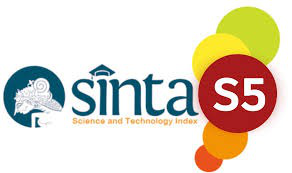The Impact of Ease of Digital Access on the Increase in Online Gambling Cases Among Students
Abstract
Keywords
Full Text:
PDFReferences
Amoah-Nuamah, J., Agyemang-Duah, W., Mensah, B., & Opoku, B. (2023). University students’ reasons and attitudes towards online gambling and its implication on their lives. Journal of Gambling Studies, 39(1), 203-224.
Delic, A. J., & Delfabbro, P. H. (2024). Profiling the potential risks and benefits of emerging “Play to Earn” games: A qualitative analysis of players’ experiences with Axie Infinity. International Journal of Mental Health and Addiction, 22(1), 634-647.
Fahrudin, A., Satispi, E., & Subardhini, M. (2024). Online gambling addiction: Problems and solutions for policymakers and stakeholders in Indonesia. Journal of Infrastructure, Policy and Development, 8(11), 9077.
Guillou-Landreat, M., Gallopel-Morvan, K., Lever, D., Le Goff, D., & Le Reste, J. Y. (2021). Gambling marketing strategies and the internet: What do we know? A systematic review. Frontiers in Psychiatry, 12, 583817.
Hing, N., Smith, M., Rockloff, M., Thorne, H., Russell, A. M., Dowling, N. A., & Breen, H. (2022). How structural changes in online gambling are shaping the contemporary experiences and behaviours of online gamblers: An interview study. BMC Public Health, 22(1), 1620.
Kamalludin, I. (2024). Women and Children as Victims of Financial-based Violence in Online Gambling Circles: A Criminological Approach to Criminal Law and Rehabilitation Policy in Indonesia. Sawwa: Jurnal Studi Gender, 19(1), 1-28.
Kolandai-Matchett, K., & Wenden Abbott, M. (2022). Gaming-gambling convergence: Trends, emerging risks, and legislative responses. International Journal of Mental Health and Addiction, 20(4), 2024-2056.
Lin, C. H., & Shih, C. H. (2024). A case study on the Online Gambling industry in Taiwan. Procedia Computer Science, 246, 4552-4562.
Liu, M. T., Dong, S., & Zhu, M. (2021). The application of digital technology in gambling industry. Asia Pacific Journal of Marketing and Logistics, 33(7), 1685-1705.
Manu, E., Acquah, F., Douglas, M., Akitty, E., Zanu, E. P., Ampomah, M. A., & Adoma, P. O. (2024). Betting high, feeling low: a cross-sectional examination of gambling severity and psychological distress among Ghanaian youth. BMC Public Health, 24(1), 2032.
Mbiriri, M. (2023). Predictive Factors for Gambling and Prevalence of Problematic Gambling Among Students in Selected Public Universities in Kenya. African Multidisciplinary Journal of Research, 8(1), 111-135.
Newall, P. W., & Talberg, N. (2023). Elite professional online poker players: Factors underlying success in a gambling game usually associated with financial loss and harm. Addiction Research & Theory, 31(6), 383-394.
Rock, L. Y., Tajudeen, F. P., & Chung, Y. W. (2024). Usage and impact of the internet-of-things-based smart home technology: a quality-of-life perspective. Universal access in the information society, 23(1), 345-364.
Rolando, S., & Wardle, H. (2024). ‘That’s why it’s gambling, because you don’t know what you find in it!’Perceptions of the relationship between gaming and gambling among young adult gamers. Journal of Youth Studies, 27(6), 869-884.
Savolainen, I., Sirola, A., Vuorinen, I., Mantere, E., & Oksanen, A. (2022). Online communities and gambling behaviors-A systematic review. Current Addiction Reports, 9(4), 400-409.
Siricharoen, N. (2024). Cultivating Critical Minds: Interdisciplinary Strategies for Empowering University Students Against Online Gambling Propaganda. Community and Social Development Journal, 25(2), 173-194.
URIEN, J. (2025). Gambling Addition among University Students in Nigeria: The Impact on their Mental Health and Academic Performance. International Journal of Research and Innovation in Social Science, 9(2), 1201-1208.
Wardle, H., & McManus, S. (2021). Suicidality and gambling among young adults in Great Britain: results from a cross-sectional online survey. The Lancet Public Health, 6(1), e39-e49.
DOI: https://doi.org/10.46336/ijeer.v5i2.940
Refbacks
- There are currently no refbacks.
Copyright (c) 2025 Rifki Saefullah, Sundarapandian Vaidyanatahan
Published By:
IJEER: Jalan Riung Ampuh No. 3, Riung Bandung, Kota Bandung 40295, Jawa Barat, Indonesia
IJEER Indexed By:
 This work is licensed under a Creative Commons Attribution 4.0 International License.
This work is licensed under a Creative Commons Attribution 4.0 International License.









